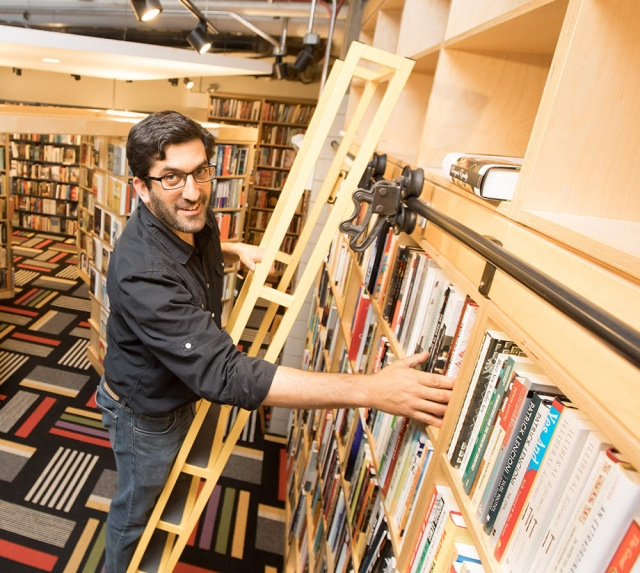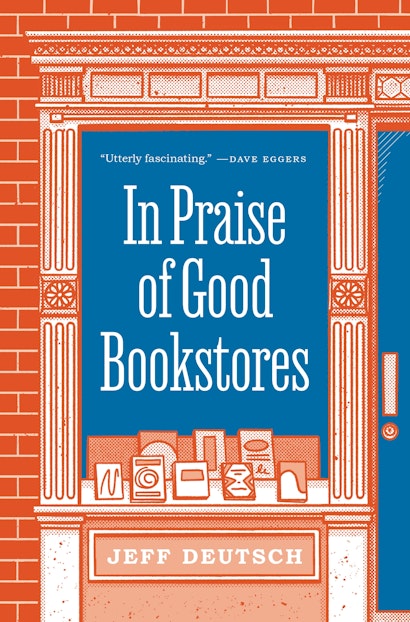We’re thrilled to welcome Jeff Deutsch to the Princeton University Press Board of Trustees. The first bookseller to join the Press’s Board, Deutsch is director of Chicago’s Seminary Co-op Bookstores, the first not-for-profit bookstores in the United States whose mission is devoted to bookselling. According to Princeton University Press Director Christie Henry, “Jeff’s partnership will help the Press continue to grow and sustain our collaborations with the bookselling community, whose resilience is as vital to our mission as our own and whose role in creating connections between publishers, authors, and readers is truly invaluable.” Recently our sales rep Lanora Haradon chatted with Jeff about bookselling, the challenges of the past year, and the key role bookstores play in communities.
Lanora Haradon (LH): What is your definition of a bookseller (as in the individual not the business entity)?
Jeff Deutsch (JD): The bookseller, through filtration, assemblage, enthusiasm, and handselling, helps readers find books and books find readers.
LH: How did you become one, and what drives you to continue?
JD: I have always felt most at home in open spaces and book-lined rooms. I worked as a library page as a teenager, and became a part-time bookseller in 1994. Had I found a job out of doors at that formative time, I might well have made a career outside, but, like most booksellers, I sort of backed into it by following my passion. I believe deeply in the work of creating thoughtful and generous physical spaces for books, and now I hope to do it for the rest of my days.
But another element that drives me to continue is unfortunate: in the 21st century, many readers think the bookstore is obsolete, and many citizens think serious reading not worth their time. I am energized by the element of advocacy the work now includes. Celebration, whether of publishers, bookstores, or both, is a key element of our work, and, for that, I’m grateful, even though I never imagined it would become necessary.
LH: What role does the bookseller play in the larger community? By this I mean, how do you see the bookseller’s impact outside the store itself?
JD: Bookstores match readers to books and books to readers. That alone would be enough. But I think there are rare bookstores that both create and reflect their communities. Jack Cella, our legendary long-time general manager, built these bookstores, and his Seminary Co-op certainly created and reflected his community. Paul Yamazaki has been doing it for 50 years and counting at City Lights Booksellers in San Francisco and Ed Devereaux has been doing it for over 40 years and counting at Unabridged Bookstore in Chicago. Moe Moskowitz did it at his eponymous bookstore in Berkeley, creating much more that just his community, but, arguably, helping create a national community, which, now that I think about it, is what Jack did. I was a member of that national community Jack created, which is why I moved halfway across the country to succeed him in 2014.
LH: Seminary Co-op’s philosophy on the curation of the books in its stacks is much different than most bookstores. What is that philosophy? How has transitioning to be a non-profit entity helped you in the selection of books you offer to your customers?
JD: Our philosophy, if you would call it one, is that the rapid pace of retail profitability is a ridiculous way to think about bookselling. Our approach privileges patience and Warburg’s Law of the Good Neighbor, which states that the book with which one is familiar is not the book one needs, but the unknown neighbor is. We expect all the books we put on our shelves might sell, but, even when they don’t, we believe they help sell other books by dint of enhancing the browsing experience.
LH: Obviously, the past 12 months have been incredibly challenging for bookstores. Your most valuable asset, connecting with your customer in your physical space, is unavailable. Tell us how you and your staff have pivoted to bring that experience outside of the bricks and mortar of the store.
JD: We know that browsing is our primary product, and that our community relies on our filtration and arrangements to discover the book they want to read next. Our brilliant marketing director, Clancey D’Isa, imagined and created a virtual catalog that helps recreate the browsing experience in the stores. Our website has long mirrored the displays in the store—the famous Front Table, for instance—and that has helped us do our work during this exceedingly difficult time.
LH: You are also the store’s historian with a deep connection and knowledge of the history of Seminary Co-op. Given the challenges of the past year, what do you think the future holds for your store, and bookstores in general? Has the experience of the past 12 months changed the way you will do business going forward? What have you and your booksellers learned from this experience?
JD: Thank you for this question. I think we have all learned anew what we thought we knew already: that our community is large and mighty and that they are moved by us in a way that far exceeds what is a typical emotional response to a retail establishment or even many cultural institutions. It has been a humbling time. The forces that have arrested our collective progress, and revealed just how fragile we all are, have also clarified what’s important to us—not just what is essential to meet our physical needs, but what feels critical to living a meaningful life. The kind notes of effusion, gratitude, encouragement, and praise have brought me and the team to tears dozens of times. I expect we’ll carry this humble sense of responsibility with us into the distant future.
I do think it will change the way we do business. How it does so is anyone’s guess, but one thing I am fairly certain of is that the model that we inherited from traditional retail (Alena Jones, the Seminary Co-op manager corrected me once when I said that the bookselling model we built as industry was broken—“we never built it,” she said, “we inherited it,” and I think she is correct) no longer serves us. My hope is that, along with other booksellers, publishers, distributors, cultural institutions, and municipalities, we might build a more deliberate model for the bookstore in the 21st century.

